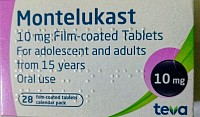Cardiac fibrosis
[Jan 2025] Montelukast may help prevent cardiac fibrosis. Cardiac fibrosis is a major cause of heart failure.
A number of Chinese universities coordinated in a study published by the European Journal of Pharmacology in 2022. In tranverse aortic constricted mice, they found that montelukast improved cardiac pumping function and inhibited cardiac fibrosis by down-regulation of the proteins related to the fibrosis.
Montelukast was found to reduce the production of proteins like connective tissue growth factor (CTGF), transforming growth factor β (TGF-β), and alpha-smooth muscle actin (α-SMA).
Montelukast was also found to reduce the number of cells that are proliferating during the fibrosis process and also reduce the amount of collagen production.
https://pubmed.ncbi.nlm.nih.gov/35358494/
In another study conducted by the Department of Pharmaceutical Sciences, University of Milan, Italy was published in Nature in 2024. In the study, mice of a type used as a model of myocardial infarction were subjected to coronary artery ligation and received montelukast. The montelukast treated mice received beneficial effects in the infarcted area and had improved cardiac pumping action when compared to the untreated mice. The results provided evidence for repurposing montelukast for cardiac diseases.
Unfortunately even though there is much evidence by using animal models that montelukast is effective in treating cardiac diseases, the difficulty lies in getting governments and institutions to sponsor clinical trials. Certainly the pharmaceutical industry is not interested in spending money on a generic drug clinical trial.
https://www.nature.com/articles/s41598-024-53936-x
Menstrual pain
[Mar 2025] An investigation was done in Japan in 2010 to test the effectiveness of montelukast in alleviating the symptoms of dysmenorrhea (moderate to severe menstrual pain).
Study design
This prospective, double-blind, randomized, placebo-controlled study was comprised of 62 patients with dysmenorrhea who were randomly divided into 2 groups (montelukast 10 mg taken 4 times a day and the placebo group). Data obtained from 50 patients were analyzed (montelukast: 24; placebo: 26). Using visual analog scale (VAS) scores and nonsteroidal anti-inflammatory drug (NSAID) usage per menstrual cycle, values before treatment were compared to average scores over two menstrual cycles with treatment.
Results
Both the VAS scores and NSAID usage decreased significantly in both groups. The decreases were greater in the montelukast group compared to the placebo group, but the differences were not statistically significant. Nevertheless, in “highly effective cases,” which were defined as having a post-treatment value less than half of the pre-treatment value, the decreases were significantly greater in the montelukast group than in the placebo group (VAS: montelukast, 4 vs. placebo, 0 (P = 0.029); NSAID: montelukast, 9 vs. placebo, 3 (P = 0.031)).
Conclusions
The present study found that montelukast may be effective in alleviating pain associated with dysmenorrhea in some women. Montelukast is safe and does not influence hormonal levels. Therefore, montelukast is a clinically reasonable management option to consider before prescribing a hormonal agent.
This trial got it right by giving an effective dosage of 10 mg 4 times a day. Unfortunately many clinical trials for other conditions have used the ineffective dosage of 10 mg once a day, which is the approved dosage for asthma. Merck really got it wrong when it submitted this low dosage to the FDA for approval 25 years ago. Montelukast, which has a half life of only about 4 hours, could have been a much more effective asthma drug at 10 mg twice or three times a day.
https://www.sciencedirect.com/science/article/abs/pii/S0301211509006460
Reducing Multiple Sclerosis relapses
[June 2025] A study was done at the University of Texas at Houston to determine if montelukast as an added treatment would reduce relapses of people with multiple sclerosis (MS).
Researchers took data supplied by medical data providers which included information on MS patients who received montelukast prescriptions for asthma and also MS patients who did not receive prescriptions. The results showed a statistically significant 23.6 percent reduction in relapses for montelukast treated MS patients compared to MS patients that were not treated.
It is important to note that the montelukast treated MS patients were given the standard 10 mg per day dosage, which is only mildly effective for asthma at this low dosage and even less effective for other conditions. If the MS patients had been treated with higher dosages, for example, 10 mg twice a day, 10 mg three times a day or 20 mg twice a day, the MS patients would have benefited much more.
We need a clinical trial which follows persons with MS who are given montelukast at higher doses and multiple times a day. If montelukast proves to be effective, then MS patients may also be able to reduce or eliminate the use of corticosteroids, which can have serious side effects.
The problem is that drug companies rarely sponsor clinical trials for generic available drugs so it is going to be up to governments and public and private institutions to sponsor a trial.
Treatment for Enlarged Prostate (BPH)
[Aug 2025] When I first started taking montelukast 10 mg twice a day in February 2016, I saw that after about a week, my extreme mental fatigue went away. After about a month of taking this drug, I got some unexpected good news. I had been experiencing some difficulty with urinating for about a year, which was due to enlarged prostate (BPH). After about a month taking montelukast, the urinary problem disappeared. Evidently montelukast reduced my prostate size by reducing inflammation.
Enlarged prostate is a common condition in older men over 50. There are two drivers of the enlarged prostate condition - prostate growth and prostate inflammation. No anti-inflammatory drug has proved effective for treating prostate inflammation, that is, until montelukast.
I am presently working with a medical doctor in Ghana who is a urologist, surgeon and university lecturer. Early results indicate that it works well at 10 mg twice a day with men in the early stage, which is before fibrosis has set in. I have suggested to the doctor that he increase the dosage to 20 mg twice a day or 10 mg three times a day to see if it can be more effective with more men.
Most of his BPH patients require surgery or other procedures and therefore are not good candidates for montelukast treatment. We are seeking early stage patients that are able to pay for the treatment, which includes the medication, ultrasounds and uroflow tests. The costs are too high for the average patient living in this area. For that reason, we have only treated a small number of men.
A safe, effective and inexpensive treatment for BPH is very much needed in low income countries like Ghana because most affected men here can not afford to pay for surgery and other procedures and often develop serious complications. Our biggest problem is getting the needed funds to pay for a clinical trial so patients don't have to pay for participating.




